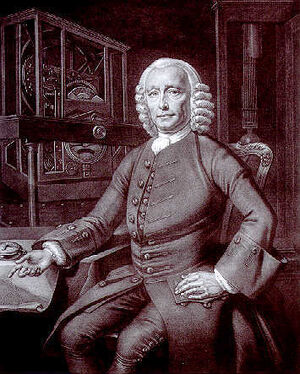John Harrison (nonfiction): Difference between revisions
Jump to navigation
Jump to search
(Created page with "File:John_Harrison.jpg|thumb|P.L. Tassaert's half-tone print of Thomas King's original 1767 portrait of John Harrison, located at the Science and Society Picture Library, Lo...") |
No edit summary |
||
| Line 3: | Line 3: | ||
His solution revolutionized navigation and greatly increased the safety of long-distance sea travel. | His solution revolutionized navigation and greatly increased the safety of long-distance sea travel. | ||
The problem he solved was considered so important following the Scilly naval disaster of 1707 that the British Parliament offered financial rewards of up to £20,000 (equivalent to £2.84 million today) under the 1714 Longitude Act. | The problem he solved was considered so important following the [[Scilly naval disaster of 1707 (nonfiction)|Scilly naval disaster of 1707]] that the British Parliament offered financial rewards of up to £20,000 (equivalent to £2.84 million today) under the 1714 Longitude Act. | ||
Harrison came 39th in the BBC's 2002 public poll of the 100 Greatest Britons. | Harrison came 39th in the BBC's 2002 public poll of the 100 Greatest Britons. | ||
| Line 17: | Line 17: | ||
* [[Chronometer (nonfiction)]] | * [[Chronometer (nonfiction)]] | ||
* [[Scilly naval disaster of 1707 (nonfiction)]] | |||
External links: | External links: | ||
Latest revision as of 21:18, 28 October 2017
John Harrison (3 April [O.S. 24 March] 1693 – 24 March 1776) was a self-educated English carpenter and clockmaker who invented a marine chronometer, a long-sought-after device for solving the problem of calculating longitude while at sea.
His solution revolutionized navigation and greatly increased the safety of long-distance sea travel.
The problem he solved was considered so important following the Scilly naval disaster of 1707 that the British Parliament offered financial rewards of up to £20,000 (equivalent to £2.84 million today) under the 1714 Longitude Act.
Harrison came 39th in the BBC's 2002 public poll of the 100 Greatest Britons.
In the News
Fiction cross-reference
Nonfiction cross-reference
External links:
- John Harrison @ Wikipedia
